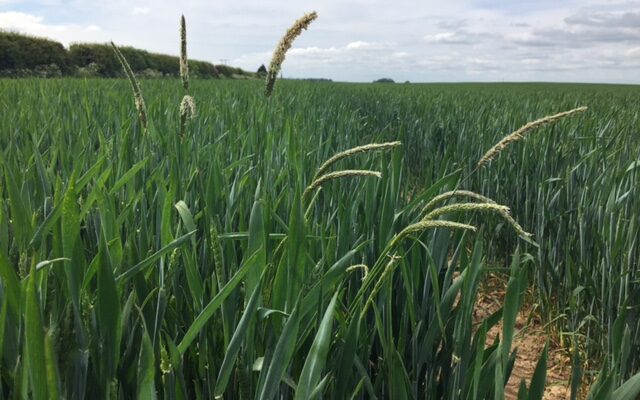
Researchers from the University of Hull are helping alleviate the devastating impact of a herbicide resistant weed, which costs UK farmers half a billion pounds in gross profit each year.
Black Grass outcompetes cereal crops for light and space – destroying enough wheat to bake more than 1.5 billion loaves of bread a year – or brew eight billion pints of beer.
Farmers have become so desperate to reduce or eradicate Black Grass, some have even resorted to destroying their own crops in a desperate attempt to control it.
Dr Sarah Shaw a Senior Lecturer & Researcher at Hull University Business School, who led the research, said: “Farmers were already doing a brilliant job of altering their practices to manage Black Grass, including spring cropping and spraying, but we needed game changing research from other disciplines to address the problem. We wanted to find real solutions in order to help reduce this financial burden.”
The team used machine learning technology to monitor the growing cycle of the weed in order to help farmers optimise chemical treatment and fertiliser use.
Dr Shaw said: “In optimising the treatment, we were able to have a real impact on the environment. “The crop pre-emergence stage is the most carbon intensive and costly because of the huge reliance on chemicals and we need to change this.”
Farmers spend approximately £112 per hectare on chemicals and other interventions (such as diesel for applying chemicals) to protect their crops. The chemicals and diesel have a subsequent carbon footprint of 118kg of CO2e per hectare. The UK agricultural sector is a significant producer of carbon, and Black Grass is further intensifying that challenge, impacting food security.
The team created a cost and carbon footprint mapping tool to accurately calculate the financial and environmental impact of Black Grass on farmers.
The carbon mapping tool calculates the carbon footprint associated with the chemical treatment used by farmers and diesel consumed around Black Grass management. This tool can be used to map the entire (Scope 3) carbon footprint of UK agricultural supply chains.
Managed by the University’s Aura Innovation Centre, which brings low-carbon ideas to life, the project brought together five farmers from across the region as well as experts from the University’s Business School and Departments of Biology, Geography, Geology and Computer Science, in a project funded by the European Regional Development Fund.
Rob Meadley, Farmer and Agricultural Business Consultant at Brown & Co, said “As farmers in East Yorkshire we face a significant challenge managing the invasive grassweed Black Grass. The insight the University of Hull have provided in the research has helped further my understanding of the weed and allowed me to think much wider regarding early identification and potential ways to deal with it.
“It is a great experience to be involved with a leading research team where your knowledge and understanding of what you do day-to-day can be looked at and questioned in different ways. I look forward to continued involvement with the research team”.
The team continue to work on the project, with links between Black Grass and conditions such as water content, geology, organic material and a soil seed index now being explored, to give farmers practical solutions on how to manage the weed.
For further information on the Black Grass research project and how the University of Hull can help with cost and carbon mapping, please contact j.bishop@hull.ac.uk
If you’d like help bringing your company’s low-carbon dreams to life, get in touch with the Aura Innovation Centre. You can see other examples of how we’ve helped SMEs on our Case Studies page.
